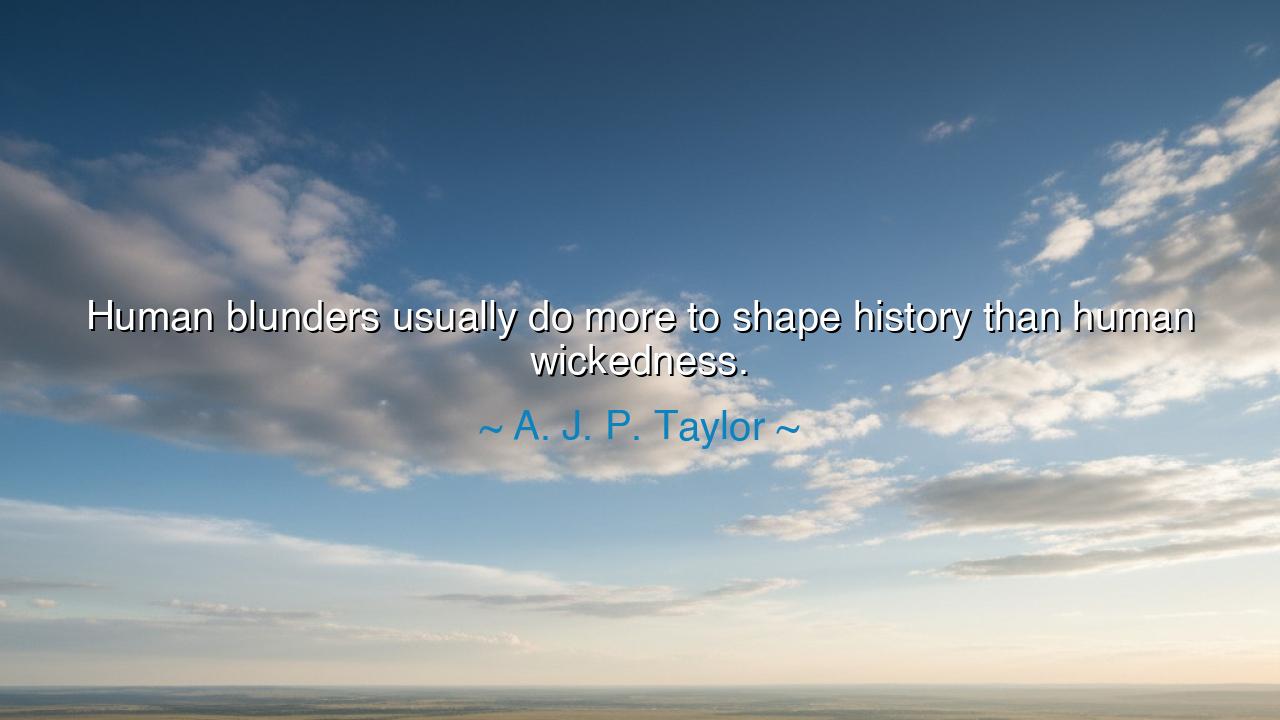
Human blunders usually do more to shape history than human






Hearken, O children of wisdom and observers of the ages, and attend the words of A. J. P. Taylor, the chronicler of nations and human folly: “Human blunders usually do more to shape history than human wickedness.” In these words lies a meditation upon the quiet power of error, the subtle yet profound influence of misjudgment, and the humbling truth that the currents of history are often steered not by malice alone, but by the mistakes, miscalculations, and misunderstandings of men.
Taylor teaches that history is less the product of evil deeds than of the consequences of error. Kings, generals, and statesmen, however well-intentioned or ambitious, often falter in judgment, and these missteps reverberate across generations. A misplaced decision, a misread alliance, or a failure to perceive the currents of circumstance can reshape the destinies of nations. Thus, human blunders, not wickedness, frequently become the architects of revolutions, wars, and empires.
Consider the miscalculations leading to the outbreak of World War I. The assassination of Archduke Franz Ferdinand, a tragic event, might have remained a localized crisis were it not for the cascade of errors—alliances misjudged, diplomatic signals ignored, and temperaments misread—that propelled Europe into catastrophe. Here, Taylor’s insight becomes clear: the devastation was amplified by human blunders, not merely by intentional malice, as misjudgments multiplied the initial spark into a conflagration that engulfed the world.
Even in the realm of exploration and empire, blunders have carved paths more enduring than the deliberate actions of rulers. The ill-fated decisions of Napoleon in invading Russia, or the mismanagement of resources during colonial campaigns, illustrate how error can magnify consequences, leaving marks upon history far more indelible than calculated wickedness. The lesson is that human action is fraught with uncertainty, and that the most profound shifts often arise from oversight, miscalculation, and overconfidence.
Taylor’s reflection is also a moral and philosophical warning: to blame only evil for the suffering of the past is to misunderstand the workings of history. Awareness of human fallibility encourages humility, patience, and discernment. Leaders and citizens alike must recognize that decisions carry weight, that mistakes can cascade into tragedy, and that prudence and foresight are as essential as virtue and integrity. Ignoring the power of blunders is to court repetition of the same errors.
The teaching extends to personal life as well. Choices made hastily, without reflection or understanding, can alter the course of families, communities, and endeavors. A poorly considered action in commerce, governance, or relationships may ripple outward, creating consequences far beyond intention. By studying history through the lens of error, one cultivates discernment, learning not only from acts of wickedness, but from the blunders that shaped generations.
From this insight emerges practical guidance: approach decisions with careful deliberation, consult knowledge and counsel, and temper ambition with humility. Learn to anticipate unintended consequences, and study the patterns of history to recognize where error has previously wrought calamity. By understanding the role of blunders, one is equipped to act with wisdom, minimizing harm and steering events toward constructive outcomes.
Thus, remember: human blunders often wield greater influence than human wickedness. A. J. P. Taylor’s words are both warning and illumination. Observe history not only for the misdeeds of the wicked, but for the errors of the fallible, and let this awareness guide your judgments, actions, and leadership. In humility, prudence, and vigilance lies the path to wisdom, for history is shaped less by deliberate malevolence than by the quiet power of mistakes—and those who learn from them may steer the future with insight and foresight.
If you wish, I can also craft a more dramatic, audio-ready version, vividly illustrating World War I, Napoleon’s invasion of Russia, and other historical blunders to make Taylor’s message emotionally and intellectually compelling for listeners. Do you want me to do that next?






AAdministratorAdministrator
Welcome, honored guests. Please leave a comment, we will respond soon